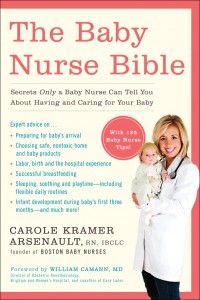I have been fortunate enough to get to know the wonderful ladies over at Boston Baby Nurses!
Carole Arsenault is president and founder of Boston Baby Nurses, an agency that provides lactation and postpartum services to women and babies. Carole’s team of nurses provides overnight support, lactation consultations and daytime nurse visits. Carole recently published The Baby Nurse Bible: Secrets Only a Baby Nurse Can Tell You about Having and Caring for Your Baby.
In case you missed the guest post that I did on Carole’s Blog, you can find out more on Fitness and Pregnancy.
Here is Carol’s Guest Post where she discusses the top 5 health/fitness related questions she gets from expectant and new moms.
What exercises should I do while pregnant to help stay fit?
Walking, swimming and modified prenatal yoga are three of the safest ways to stay fit while pregnant. Try and do one of these activities for at least 30 minutes a day if possible. If you regularly participate in low-impact exercises throughout pregnancy you should see that your body combats “typical” pregnancy aches and pains.
Can I safely run while pregnant?
If you were a runner before your pregnancy, you should be able to run safely during your first and second trimesters—but check with your health care provider for details and to get clearance. You’ll want to take it easy while running—not pushing too hard or overheating yourself, and staying very well hydrated is key.
However, I would like to add a physical therapist and women’s health advocate’s perspective on the matter of running during pregnancy. Due to the immense pressure on pelvic health from pregnancy alone, Mom, Physical Therapist and co-founder of Marathon Physical Therapy Jessica McKinney says:
From both a professional and personal perspective, I discourage running during pregnancy and chose to avoid running in each of my three pregnancies. The reasons were not fear of the effect of intense exercise on my baby—I continued to exercise vigorously throughout each pregnancy—but on my long-term pelvic health.
Like most women, I want my pelvic joints to be stable postpartum and I want to avoid any unnecessary risk of pelvic organ prolapse or incontinence. This matters because running is a mechanically challenging task under “normal” circumstances, amplifying the forces absorbed by 3-5 times one’s body weight with each foot strike. When you consider the weight gain (thus more pounds of force per heel strike) associated with pregnancy and the increased motion in the joints, running becomes an inherently more mechanically demanding task during pregnancy. Add to this that uterine weight increases 18-20 times during pregnancy and that this heavy uterus is not bolted firmly in place, but is supported in its place by ligaments that are vulnerable to stretch. That stretching increases in relationship to the stresses and forces it encounters.
Are there any particular exercises I should avoid during my pregnancy?
Yes—you’ll want to avoid overly strenuous exercises. A good measure of this is to see
whether you can carry on a conversation. If you can’t due to breathing too rapidly, you should tone it down. Stay away from risky activities such as skiing, horseback riding, biking and contact sports. You should also avoid exercises performed flat on your back or that engage your abdominal muscles directly (such as crunches and sit-ups).
When can I start exercising after giving birth?
You can and should start light walking within days after giving birth—this helps get things moving and will make you feel good. If you give birth vaginally you should wait six weeks before starting any rigorous exercising and possibly longer if you had a cesarean section. Bottom line: Check with your healthcare provider before resuming—depending on the effects of pregnancy and birth on your body, you may even want to ask about physical therapy to get your body back into a stable condition before exercising.
When can I expect to return to my pre-pregnancy weight?
Rule #1—don’t put too much pressure (or a rigid deadline) on yourself to lose the baby weight, especially during the first few months. It may be cliché but it did take nine full months for your body to prepare for the birth of your baby and it may very well take that long for it to “go back” to its pre-pregnancy weight. Stay positive and keep in mind that every mom is different. In the immediate weeks following your baby’s birth you should focus on bonding, baby care, and getting sleep!

Having said that, I whole-heartedly encourage healthy eating and exercise as soon as you have the go-ahead from your health care provider to do so. This will help you feel energized and get you on the right track to accomplishing your fitness goals. And don’t be afraid to seek help and inspiration—from group fitness classes geared toward mom and baby to personal trainers and physical therapists, there are many resources out there to help you.
Carole Kramer-Arsenault, RN, Lactation Consultant, & Mom is author of The Baby Nurse Bible, founder of Boston Baby Nurse, and offers pregnancy and baby advice at her blog Carolearsenault.wordpress.com.

Great info! I really miss pushing myself physically because sometimes I feel my incline walks on the treadmill feel too challenging (sad). I look forward to getting back in shape after baby comes.